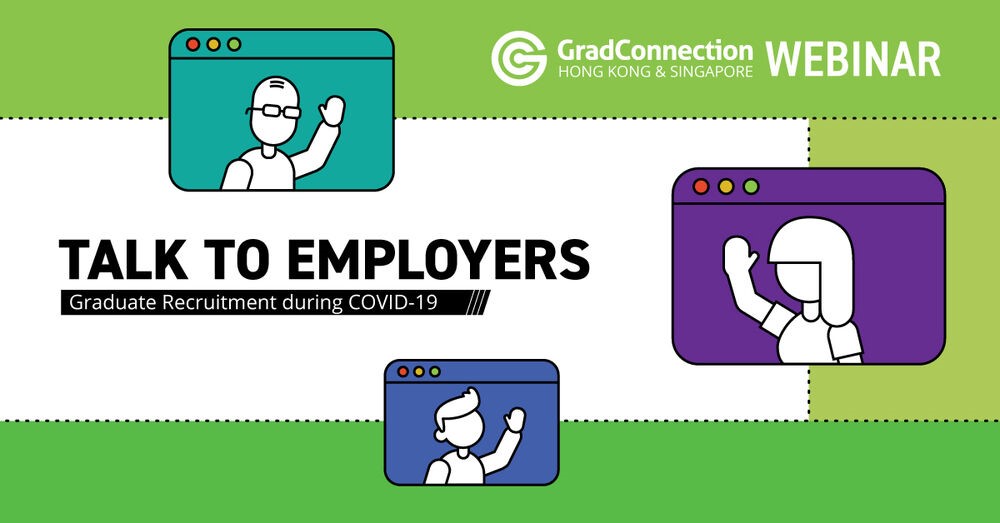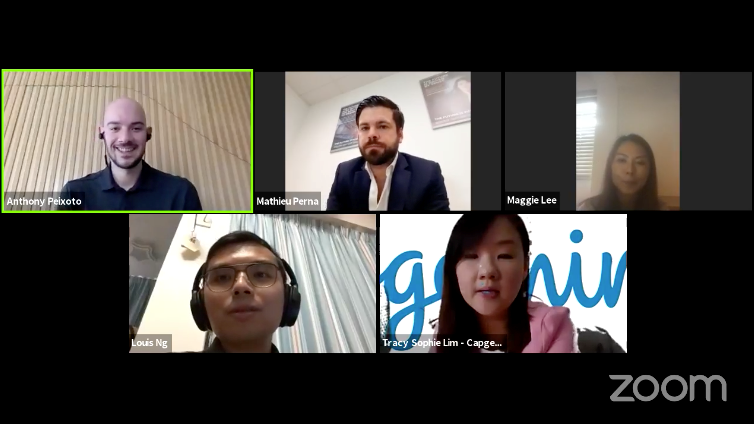

GradConnection hosted this webinar for students on 3rd June to help shine a light on the uncertainties surrounding the COVID-19 pandemic. Our expert panel of graduate employers in different industry sectors in Hong Kong and Singapore discussed how students can best prepare for their job search this year, including advice for virtual interviews and assessment centers, accepting an offer, and starting a career.
Watch the recording here.
Panelists:
Louis Ng, Senior Manager for Early Careers and Talent Acquisition APAC (Fidelity International)
Maggie Lee, APAC Head of Campus Recruitment (BlackRock)
Mathieu Perna, VP Campus Recruitment (Société Générale)
Tracy Lim, Graduate Program Lead for HK & SEA (Capgemini)
Questions & Answers:
1. Are companies still hiring graduates and students during COVID-19?
Maggie from BlackRock expressed that campus recruitment is still ongoing. Recruiters she knows are busy planning for internships as well as preparing for hiring next year. She added that campus recruitment is part of the strategic planning of a company’s future. Despite the number of intakes might change every year, if a company wants to build the workforce in the long run, they will still be hiring.
Louis from Fidelity International echoed that financial services companies are still hiring. They usually plan their graduate programme 2 to 3 years ahead and so they will have a good forecast on the headcounts required in the next 2 to 3 years. He reiterated that students should simply apply for jobs they are interested in and need not worry about the hiring number of each company. If you are a good fit for the company, you will be the one selected regardless how many they hire.
Tracy from Capgemini shared that they have recruited 26 graduates this year, of which 14 in Singapore, 6 in Hong Kong and 6 in Malaysia. They are going to launch their graduate programme in the Philippines. There are a lot of opportunities out there so students just need to look out more on LinkedIn. She added that campus recruitment is the core infrastructure of most companies and so recruiting young talents is important.
Mathieu from Société Générale mentioned that there is no change to junior recruitment and companies are still hiring. The only difference he noticed is that the selection and interview process going digital now.
2. Is there any impact on the recruitment process during COVID-19?
Louis from Fidelity International explained that a full-scale assessment centre was not possible so they had to be creative and flexible. They tried virtual assessment and it went well. They provided clear instructions to candidates and conducted testing with them before the actual assessment took place. Student candidates should keep in mind that recruiters will rate everyone in a fair and transparent way in any circumstances.
3. How can students prepare themselves for virtual assessment and virtual internship?
Maggie from BlackRock mentioned that they reviewed what essential elements they want to keep in the virtual internship programme and how to deliver them virtually. She believed that student should not stop networking during virtual internships. There are a lot of tools in the market for setting up virtual social events. They will try to make the virtual internship experience as good as a face to face one for students.
4. Is there any restriction on virtual internship in terms of nationality?
Mathieu from Société Générale said their programme is open to everyone from everywhere which allows them to reach a wider audience.
5. Apart from virtual career fairs, would you recommend any other tools for students to network with employers?
Louis from Fidelity International suggested students to conduct more research on the company websites and LinkedIn to find out more. Students are recommended to connect with their alumni more, so they get insights about working in different industries and companies. They can also understand more what type of candidates the company is looking for in order to stand out from the competition.
Tracy from Capgemini added that if students are interested in a particular company or industry, they should find a way to connect with a senior from the university to learn more about the hiring requirements. She will give higher priority to a candidate referred by a senior.
6. Are there any particular areas that international students need to pay attention to when they do their job search? (For example, language ability, visa?)
Louis from Fidelity International believed that language requirements are dependent on the role itself and the team you are applying for. Students are advised to do more research and pay attention to the requirements (including language) when applying for jobs. In terms of employment visa, most big companies are willing to sponsor if the candidate is a good fit for the job. He emphasized the importance of internships because most financial services firms will fill a graduate position through internship.
Mathieu from Société Générale commented that while language requirement depends very much on the roles, good command of English is essential. In addition, the ability to work in the team and communicate with peers effectively are equally important.
7. Do you have any tips for students to prepare themselves for the “Work from Home” mode?
Maggie from BlackRock suggested to look for a space at home that you feel comfortable working with the required technical setup. There are also plenty of professional tips and guide online about how to work remotely. Most important of all is that students need not feel afraid to reach out to people while working from home because connection is important even if you are not working in an office.
Tracy from Capgemini advised interns to connect with other interns and graduates within the programme and other locations. Setting up a workspace with a work laptop and taking periodic breaks are also essential. Interns need to be mindful about time zones and public holidays because there are teams working in different locations.
8. Do you anticipate all virtual platforms will still be in use after COVID-19?
Mathieu from Société Générale believed we are in a “new normal” situation with digital transformation going on and working from home possible while keeping the business going. Finding the right balance with a flexible environment in the future is key. Managers can also empower and trust their staff more which will help increasing the level of productivity.
9. Should students hold on to their first offer during this unusual time in particular? What is your recommendation?
Louis from Fidelity International remarked that students need to be selective and apply for the position they are most interested in. They might need to think first which industry they like to start off their career. Students are advised not to hold on to or accept an offer that they do not have genuine or enough interest in. They can always seek advice from career centre if they have any doubts or uncertainties when accepting a job offer. He reinforced that once students have accepted an offer, they should commit all the way to it.
Maggie from BlackRock supplemented that self-reflection is essential so students need to think what they want to achieve short term and long term, and how the job can help them achieve their goals while taking into consideration their personal circumstances.
10. Is there any change to the recruitment timeline in general? How long should students allow themselves to get prepared for their job search and job applications?
Mathieu from Société Générale commented there is no change to the recruitment timeline, and they are as selective as before. They still want to select and hire the best candidate. Though there are no campus events at the moment for students to meet with employers, they should make their effort and research companies online more instead.
Louis from Fidelity International added the recruitment timeline is pretty much similar as before unless there are changes to the new semester starting date. He suggested that students can engage with them through their events (be it virtually or face to face) if there is one, do more research online and reach out to previous interns and graduates to find out as much information from them as possible.
11. Do you have any tips for students to navigate virtual career events more effectively?
Mathieu from Société Générale expressed that there are a lot of resources online and webinars organized by employers, service providers, recruiting firms that every student can have access to where preparing for their job search apart from virtual career fairs organized by universities.
12. Do you foresee the career events in Singapore will go virtual or back to face to face during the upcoming recruitment season?
Tracy from Capgemini expected career events will stay virtual in the new recruitment season in Singapore. She encouraged students to research which industry or companies they want to work in, find out the respective recruiters, add them in on LinkedIn and ask relevant questions as well as taking extra steps to send them their resume.
Maggie from BlackRock supplemented that she noticed students have always been resourceful before COVID-19. They should now learn to leverage more on the available tools and resources out there and be more creative in terms of finding information about industry and companies they are interested in and building connections with employers.
13. Do you have any suggestions for virtual interviews?
Tracy from Capgemini explained there are three important aspects employers will look for – ability to work, willingness to do the job and whether you can fit in to the company culture. In terms of soft skills, they are looking for candidates who can communicate effectively. She elaborated that candidates need to avoid being generic when describing their interest and skill sets. They need to articulate and be more specific why they are interested in the firm, what their interests are, what trainings and learnings they had.
14. Do you have any tips for MBA/Master graduates when doing their job search?
Louis from Fidelity International mentioned that MBA/Master graduates in Asia do not have much working experience so they need to be more targeted and look for companies who have specific programmes for them. Most employers are willing to accept Master graduates in undergraduate jobs but not the case for MBA students. Students need to think thoroughly what they want to achieve in their career when deciding whether they want to go for a Master or MBA course.
15. Do you have any advice for the ethnic minority students when applying for jobs?
Louis from Fidelity International expressed that gender and nationality are not important when selecting a candidate. During job application, applicants are often required to provide gender and nationality, but they are collected for statistical purpose only and do not have any impact on the selection process. Ethnic minority student should apply for jobs they like, they will not be less disadvantaged during the selection process and so they need not worry about their nationality. Employers will assess all candidates based on their capability and skill set, regardless where they are coming from.
Mathieu from Société Générale added that the skillsets, the ability and willingness to learn are more much more important than anything else. Diversity foster innovation and makes the company and the world better. Everyone stands the same chance so just show your best at the interview.
Maggie from BlackRock reassured that employers assess only the skill set of a candidate and not their background.
16. To round up, do you see any positives out of the COVID-19 situation?
Louis from Fidelity International said the company emphasizes a lot more on mental wellbeing, trying to spice thing up wherever possible and make zoom calls more fun.
Tracy from Capgemini understands students are not going to do trips after graduation because of COVID-19. They should make use of the time instead to pick up skills that they could put on their resumes, practice more on their interview skills, think more what you want before embarking on your career journey. They should also familiarize themselves more with different online tools which are required for most of the jobs.
Mathieu from Société Générale advised interns and graduates not to be shy and speak up more. They have a chance to make a difference for the company. Their viewpoints and comments are as important as those from seniors.
Maggie from BlackRock added that it is important to look after yourself, keep a strong mind, stay healthy physically and be resilient to deal with change.
